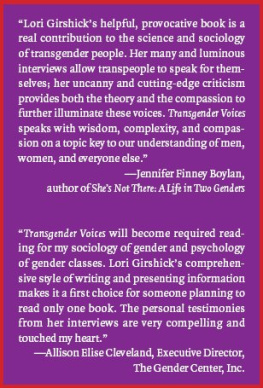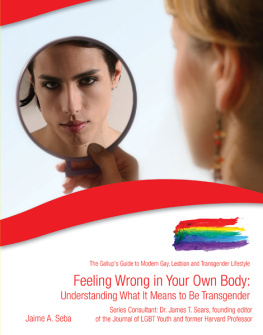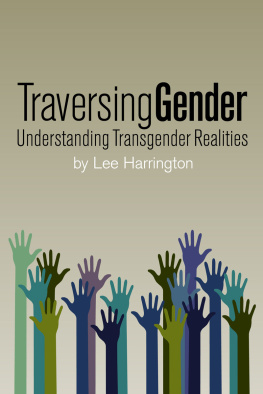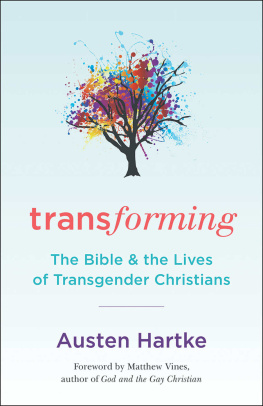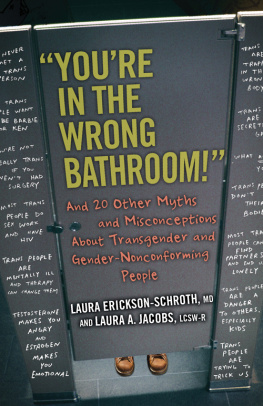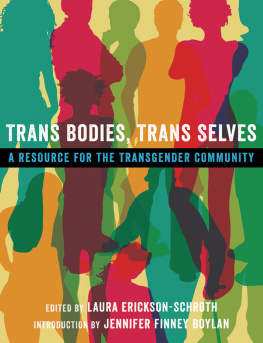Girshick Lori B - Transgender Voices: Beyond Women and Men
Here you can read online Girshick Lori B - Transgender Voices: Beyond Women and Men full text of the book (entire story) in english for free. Download pdf and epub, get meaning, cover and reviews about this ebook. City: Hanover, year: 2008, publisher: University Press of New England, genre: Politics. Description of the work, (preface) as well as reviews are available. Best literature library LitArk.com created for fans of good reading and offers a wide selection of genres:
Romance novel
Science fiction
Adventure
Detective
Science
History
Home and family
Prose
Art
Politics
Computer
Non-fiction
Religion
Business
Children
Humor
Choose a favorite category and find really read worthwhile books. Enjoy immersion in the world of imagination, feel the emotions of the characters or learn something new for yourself, make an fascinating discovery.
- Book:Transgender Voices: Beyond Women and Men
- Author:
- Publisher:University Press of New England
- Genre:
- Year:2008
- City:Hanover
- Rating:3 / 5
- Favourites:Add to favourites
- Your mark:
- 60
- 1
- 2
- 3
- 4
- 5
Transgender Voices: Beyond Women and Men: summary, description and annotation
We offer to read an annotation, description, summary or preface (depends on what the author of the book "Transgender Voices: Beyond Women and Men" wrote himself). If you haven't found the necessary information about the book — write in the comments, we will try to find it.
A revealing look at the lives and perspectives of transgender and gender variant people, based on 150 personal interviews.
Transgender Voices: Beyond Women and Men — read online for free the complete book (whole text) full work
Below is the text of the book, divided by pages. System saving the place of the last page read, allows you to conveniently read the book "Transgender Voices: Beyond Women and Men" online for free, without having to search again every time where you left off. Put a bookmark, and you can go to the page where you finished reading at any time.
Font size:
Interval:
Bookmark:

VOICES Beyond Women and Men
Lori B. Girshick
University Press of New England | Hanover and London
Published by University Press of New England,
One Court Street, Lebanon, NH 03766
www.upne.com
2008 by University Press of New England
All rights reserved. No part of this book may be reproduced in any form or by any electronic or mechanical means, including storage and retrieval systems, without permission in writing from the publisher, except by a reviewer, who may quote brief passages in a review. Members of educational institutions and organizations wishing to photocopy any of the work for classroom use, or authors and publishers who would like to obtain permission for any of the material in the work, should contact Permissions, University Press of New England, One Court Street, Lebanon, NH 03766.
Library of Congress Cataloging-in-Publication Data
Girshick, Lori B.
Transgender voices : voices beyond women and men / Lori B. Girshick.
p. cm.
Includes bibliographical references.
ISBN-13: 978-1-58465-838-2 (cloth : alk. paper)
ISBN-10: 1-58465-645-x (cloth : alk. paper)
1. Transgender peopleInterviews. 2. Transgenderism. I. Title.
HQ77.7.G57 2008
306.7698dc22 2007049350
This book is dedicated to kari, writer and gender activist extraordinaire.
Generalizations of femaleness and maleness have long served as tools to enforce social order. Regardless of the details, which would certainly differ from tribe to tribe, from culture to culture, through language, and be influenced by geographic and economic conditions, the categorization of sexed human bodies and the interpretation of gendered identities and expressions have benefited some people and oppressed others for as long as human beings have told the stories of their lives. It is astounding to me that it has taken our society so long to listen to these stories. I can't imagine that they weren't being told, but I can imagine that they were suppressed, and that this was likely often done with great violence.
From the mid-nineteenth to the mid-twentieth centuries, the nascent sciences of sexology and psychology/psychiatry held sway over the definition of normal sexual and gendered behavior in Europe, America, and everywhere their influence could reach. By naming and classifying behaviors, and by creating a system of deviations, and even criminalizing variance (deviations that caused no harm to person or property), the masters of these belief systems exerted a new level of control with which they intendedconsciously or unconsciously, benignly or officiouslyto shape society. In the same period, medical scientists confronted intersex and gender-variant infants, toddlers, adolescents, and adults, and contrived to enforce sex and gender norms on them as well. But in the midand late twentieth century, people who lived outside these binaries began to speak up, to assert their own integrity, and to demand respect for their bodies and their psyches. Lori Girshick is one of the academic social researchers who have been listening.
Girshick's previous work on same-sex domestic and sexual violence, homophobia and heterosexism, and abused women in prison has prepared her well for hearing the stories of sex- and gender-diverse people. She knows how to listen for the systematic oppression and for the damage to selfhood that occurs when gender-diverse people interact with a hostile world, and she understands how to convey to others just why that damage and oppression must be stopped. As Girshick says (in chapter 4), Policing artificially rigid identity boundaries creates a false sense of security. She is speaking in this instance about lesbian unease with female-to-male transitions, but the statement is true in every demographic. When we create barriers to seeing other people as equal human beings, we not only circumscribe our own world; we also create psychicand often physicaldamage that reverberates through our social environment and erodes the very principles of freedom, morality, and justice.
In Transgender Voices, Girshick takes on the difficult task of describing and explaining the complexity beyond the common labels that transpeople have been struggling with for the past century or more, ever since the early sexologists, psychiatrists, and criminologists began their ascendancy. She offers readers transpeople speaking in their own voices about identity, coming out, passing, sexual orientation, relationship negotiations, and the dynamics of attraction, homophobia (including internalized fears), and bullying. She exposes the guilt and the shame that gender police (bullies and fearful people) use in their attempts to exert control. She points out the viciousness with which the gender binary is reinforced in order to protect the sanctity of gender-segregated bathrooms and the moral and ethical folly of that approach. She illuminates the hypocrisy with which transpeople are bludgeoned by an ignorant and vengeful society. It is not always a pretty picture, but it is still an intriguing one, one that needs to be seen, with a chorus of voices that need to be heard.
Girshick also explores the notion of a gender continuum, promoting the helpful concept of parallel continua, though the nature of the English language and the logical structures it imposes on our collective thinking makes it somewhat difficult to get across as something larger than a string running between two poles. This difficulty notwithstanding, she endeavors to illustrate, by showing us a variety of descriptions of diverse real lives, that there is nothing inherently binary about gender, that the way each of us experiences our own gender and our own gender variance is, in fact, normal and natural. Normal is not the same as conforming. Girshick's analysis of gender as perceived, experienced, and expressed by her 150 study participants shows that the common denominators of male/masculine and female/feminine may be illusions, stereotypes invoked so that society doesn't have to bother with a much more complex reality.
Girshick says (epilogue), Gender diversity is the liberation issue of our times and should be put at center stage. I agree. As in every other liberation movement, there is an oppressor whose tyranny must be exposed; in the case of trans and intersex people, that oppressor is anyone who believes there is only one way to be, and that way is the way they want you to be, NOT the way each individual feels her- or him- or eir-self to be with respect to their own gender and sexuality. Further, the oppressor in this case also believes that gender and sexuality are fixed and immutable, and wishes to ensure that everyone remains fixed the way the tyrant sees/perceives/desires them. The fact that trans and intersex people are apparently a minority makes this oppression that much easierfor now. But as more people raise their voices, and as more scholars, activists, and allies take these issues on, social change is inevitable, and social justice for all grows more achievable.
Jamison Green
Oakland, California
July 27, 2007
It's hard to know where to begin to appreciate the many people I've met and the experiences I have had that led me to write this book. I have been privileged to find creative spaces, whether at gender conferences, in books I've read, during discussion with friends, or even in my reaction to reports of daily discrimination and the horrors of hate crimes, that helped me form my opinions and commitment to gender equality in its fullest scope and form.
I am grateful to the writer of the letter I refer to in the introduction, who challenged me to rethink my ideas of the category of woman. This man, who had been born with a female biology, asked me questions that made crystal clear to me how narrow my ideas really were. Trans and intersex issues were invisible to me, and I am grateful to have been jolted awake and spurred to action.
Font size:
Interval:
Bookmark:
Similar books «Transgender Voices: Beyond Women and Men»
Look at similar books to Transgender Voices: Beyond Women and Men. We have selected literature similar in name and meaning in the hope of providing readers with more options to find new, interesting, not yet read works.
Discussion, reviews of the book Transgender Voices: Beyond Women and Men and just readers' own opinions. Leave your comments, write what you think about the work, its meaning or the main characters. Specify what exactly you liked and what you didn't like, and why you think so.

